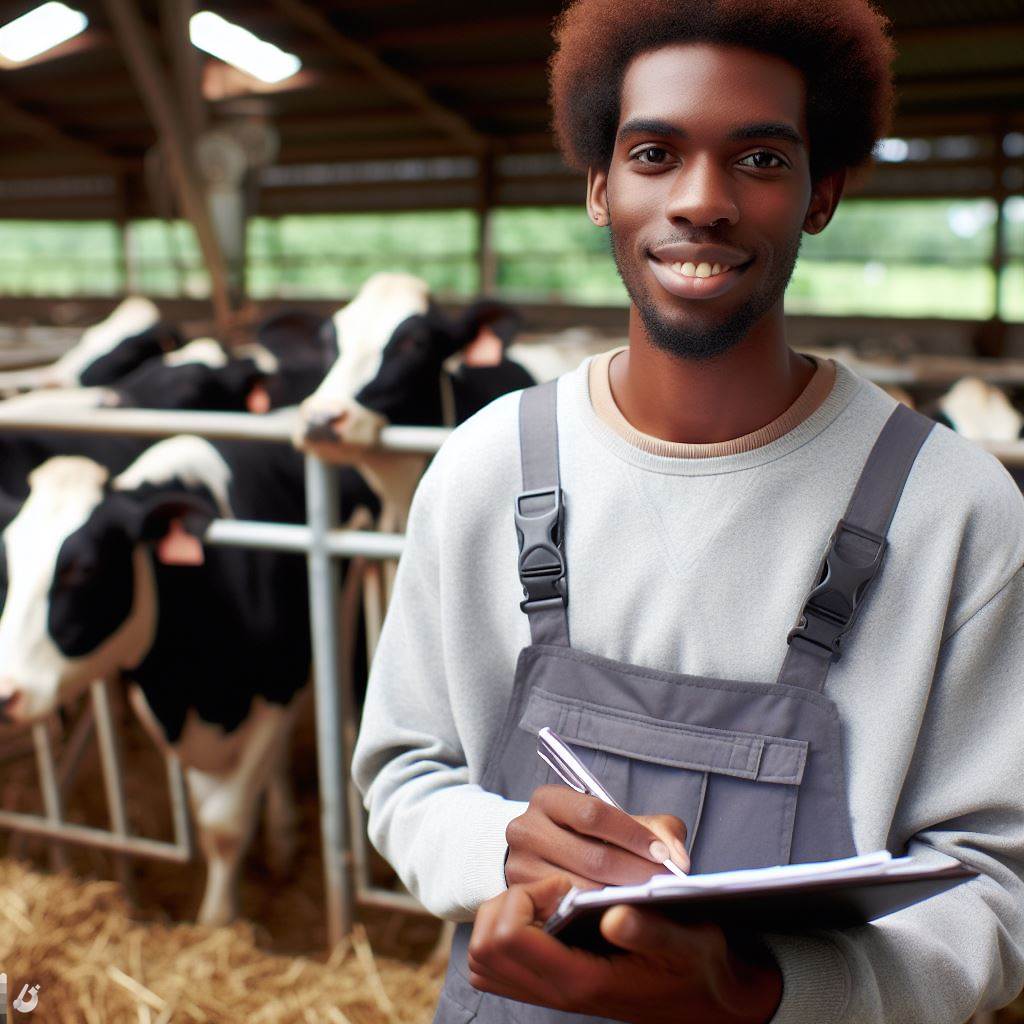Introduction
Nigerian Universities Animal Production Research: Animal production research plays a crucial role in Nigeria, as it contributes to the development of the agricultural sector and provides solutions to improve livestock production.
Nigerian universities play a significant role in advancing animal production research, providing expertise and resources to support this field.
Importance of Animal Production Research in Nigeria
Animal production research is pivotal in addressing food security, economic growth, and sustainable agriculture in Nigeria.
- Enhancing Livestock Health: Active research improves disease resistance, ensuring healthier livestock populations and reducing economic losses for farmers.
- Boosting Productivity: Innovative breeding techniques and nutritional strategies enhance animal performance, increasing meat, milk, and egg production.
- Sustainable Agriculture: Research focuses on eco-friendly practices, minimizing environmental impact and promoting sustainable livestock farming for future generations.
Nigerian Universities’ Role in Advancing Animal Production Research:
- Cutting-edge Research Facilities: Universities invest in state-of-the-art laboratories, fostering advanced studies in animal genetics, nutrition, and health.
- Collaborative Partnerships: Collaborations with industry experts and international institutions create a dynamic environment for knowledge exchange and research synergy.
- Specialized Research Centers: Dedicated animal production research centers within universities focus on specific aspects like poultry, cattle, or aquaculture, ensuring in-depth expertise.
- Academic Programs: Specialized undergraduate and postgraduate programs equip students with the latest knowledge and skills, fostering a new generation of animal scientists.
- Extension Services: Universities extend research findings to local farmers through outreach programs, promoting the adoption of modern practices for improved productivity.
In essence, Nigerian universities play a pivotal role in advancing animal production research, contributing significantly to the nation’s agricultural development and food security.
Major research areas in animal production
Nigerian universities have been actively advancing research in animal production. These institutions play a vital role in improving the livestock sector by conducting studies in various areas.
Genetics and breeding
Genetics and breeding are major research areas that receive significant attention. Scientists work on breeding programs tailored to enhance livestock quality.
By implementing selective breeding techniques, they aim to improve traits such as disease resistance, growth rate, and productivity.
In addition, researchers focus on identifying genetic markers associated with disease resistance in animals.
Understanding the genetic basis of resistance can lead to the development of more resilient livestock, reducing the impact of common diseases on the industry.
Nutrition and feeding
Nutrition and feeding also play a crucial role in animal production. Scientists strive to formulate cost-effective and nutritious diets for livestock.
By optimizing the composition of animal feed, they aim to enhance growth, reproduction, and overall animal health.
Furthermore, researchers investigate the utilization of locally available feed resources in order to develop sustainable feeding strategies.
This approach reduces dependency on expensive imported feed and promotes the use of indigenous resources, thereby contributing to the economic viability of the livestock industry.
Health and disease management
Health and disease management is another significant research area. Scientists focus on developing vaccines and effective treatment methods for common livestock diseases.
By improving disease prevention and control, they aim to minimize economic losses and ensure the well-being of animals.
Additionally, researchers emphasize the enhancement of animal welfare practices. They study ways to improve housing conditions, handling techniques, and overall care of livestock.
By implementing better welfare practices, the industry can not only improve animal health and productivity but also meet international standards and consumer expectations.
Reproduction and reproductive technologies
Reproduction and reproductive technologies are also areas of research in Nigerian universities. Scientists aim to improve reproductive efficiency in livestock through various means.
By enhancing techniques such as estrus synchronization, pregnancy detection, and artificial insemination, they decrease the time and cost required to achieve pregnancy and optimize breeding outcomes.
Furthermore, researchers explore advanced reproductive technologies like embryo transfer.
These techniques enable the production of superior offspring by allowing genetically valuable embryos to be transferred to recipient animals, maximizing the impact of successful breeding.
In fact, Nigerian universities are actively engaged in research areas that advance animal production.
Through their studies in genetics and breeding, nutrition and feeding, health and disease management, and reproduction, these institutions contribute to the improvement and sustainability of the livestock sector.
Their efforts ultimately pave the way for a more productive, resilient, and economically viable animal production industry in Nigeria.
Read: Financial Aspects: Pursuing Animal Nutrition in Nigerian Varsities
Nigerian universities leading animal production research
Federal University of Agriculture, Abeokuta (FUNAAB)
Research projects and achievements
The Federal University of Agriculture, Abeokuta (FUNAAB) has made significant progress in animal production research.
Their projects focus on improving livestock breeding, nutrition, and management techniques.
One notable research project conducted by FUNAAB is the development of a new breed of goats resistant to common diseases and capable of yielding high meat and milk production.
They have also achieved success in utilizing biotechnology to enhance animal reproduction and breed desirable traits in livestock.
Collaborations and partnerships
FUNAAB recognizes the importance of collaboration in advancing animal production research.
They have established partnerships with international organizations, such as the Food and Agriculture Organization (FAO), to exchange knowledge and resources.
Furthermore, FUNAAB collaborates with other Nigerian universities and research institutions to share expertise and jointly tackle challenges in the field of animal production.
University of Ibadan (UI)
Research projects and achievements
The University of Ibadan (UI) is another leading Nigerian university that is actively contributing to animal production research.
Their research projects primarily focus on improving livestock genetics, animal health, and welfare.
UI has successfully developed vaccines against common livestock diseases, which has helped improve the overall health and productivity of animals in Nigeria.
Collaborations and partnerships
UI has established partnerships with renowned international agricultural research institutions, such as the International Livestock Research Institute (ILRI), to strengthen their animal production research capabilities.
They also collaborate with Nigerian government agencies and industry stakeholders to ensure the translation of their research findings into practical applications for the benefit of farmers and the livestock industry.
Obafemi Awolowo University (OAU)
Research projects and achievements
Obafemi Awolowo University (OAU) is actively involved in animal production research, with a focus on sustainable livestock farming practices.
One of their key research projects revolves around developing innovative feed formulations to enhance the nutritional content of animal diets and promote efficient feed utilization.
Transform Your Career with Expert Guidance
Get personalized mentorship consulting that’s tailored to your unique path. Our expert advice is actionable and exclusive.
Get StartedOAU has also made significant contributions to improving poultry management techniques and disease control in Nigeria.
Collaborations and partnerships
OAU collaborates with national and international organizations, including the Nigerian Institute of Animal Science (NIAS) and the Africa Rice Center, to promote knowledge exchange and improve animal production practices.
Through these collaborations, OAU aims to develop practical solutions to address the challenges faced by the livestock industry in Nigeria, such as climate change and disease outbreaks.
In essence, Nigerian universities, such as the Federal University of Agriculture, Abeokuta (FUNAAB), the University of Ibadan (UI), and Obafemi Awolowo University (OAU), are at the forefront of advancing animal production research in the country.
Through their research projects, collaborations, and partnerships, these universities are making significant contributions to improving livestock breeding, nutrition, and management techniques, as well as developing sustainable and innovative practices for the livestock industry in Nigeria.
Read: The Impact of Nigeria’s Climate on Animal Science Education
Technology adoption and transfer in animal production research
Importance of technology adoption for sustainable animal production
- Technology adoption plays a vital role in improving productivity and efficiency in animal production.
- Adoption of new technologies can lead to increased profitability and sustainability in the sector.
- Advanced technologies can help address challenges such as disease prevention, feed efficiency, and genetic improvement.
- Nigerian universities are actively involved in developing and promoting innovative technologies for animal production.
Efforts made by Nigerian universities to transfer research findings to farmers
Training programs for farmers
- Nigerian universities organize training programs to educate farmers on the latest animal production technologies.
- These programs provide practical knowledge and skills necessary for successful adoption of new technologies.
- Farmers learn about best practices in areas such as animal nutrition, disease management, and breeding techniques.
Extension services and outreach initiatives
- Nigerian universities collaborate with agricultural extension agencies to provide technical support to farmers.
- Extension workers visit farms, assess the needs of farmers, and offer guidance on implementing research findings.
- Farmers receive personalized recommendations and advice based on their specific production systems.
- Extension services also facilitate the transfer of new technologies, equipment, and inputs to farmers.
Essentially, technology adoption and transfer play a crucial role in advancing animal production research in Nigeria.
Nigerian universities recognize the importance of disseminating research findings to farmers and actively engage in various initiatives to achieve this.
Through training programs, extension services, and outreach initiatives, farmers are equipped with the necessary knowledge and skills to adopt innovative technologies.
This not only improves productivity and profitability but also contributes to sustainable animal production in the country.
Read: Modern Techniques & Trends in Nigerian Animal Nutrition Courses

Impact of animal production research on the Nigerian economy
Improved livestock productivity and profitability
Animal production research in Nigerian universities has played a significant role in improving livestock productivity and profitability in the country.
Through research, scientists have been able to develop innovative technologies and practices that have enhanced breeding, nutrition, and disease control.
These advancements have resulted in higher-quality animal products such as meat and dairy, which command higher prices in the market.
Improved productivity and profitability have boosted the income of farmers and contributed to the overall growth of the Nigerian economy.
Contribution to food security and self-sufficiency
Animal production research conducted in Nigerian universities has also greatly contributed to food security and self-sufficiency in the country.
Through research, scientists have identified ways to increase animal production, ensuring a steady supply of meat, milk, eggs, and other animal-based products.
By addressing issues related to breeding, nutrition, and disease control, researchers have been able to enhance the overall health and productivity of livestock.
This has helped to meet the increasing demand for animal products in Nigeria and reduce the country’s reliance on imports.
Creation of job opportunities in the agricultural sector
Another significant impact of animal production research in Nigerian universities is the creation of job opportunities in the agricultural sector.
The advancements in livestock breeding, healthcare, and management practices have led to the emergence of new businesses and industries.
Entrepreneurs and investors have capitalized on the findings of research to establish commercial farms, animal feed production facilities, veterinary clinics, and other related enterprises.
These developments have not only created job opportunities for farmers but also for professionals in various agricultural fields such as veterinary medicine and animal science.
Ultimately, the impact of animal production research in Nigerian universities on the country’s economy cannot be overstated.
Improved livestock productivity and profitability have increased farmers’ income and contributed to economic growth.
Additionally, research has played a crucial role in ensuring food security and reducing dependence on imports.
Moreover, the creation of job opportunities in the agricultural sector has positively impacted employment rates.
Overall, animal production research continues to be a driving force behind the development of Nigeria’s livestock industry and its economy as a whole.
Read: Field Trips & Practical Experiences in Nigerian Animal Science
Challenges and Future Prospects
Nigerian universities are actively advancing animal production research, but they face various challenges and have future prospects for further growth and development.
Funding Constraints and Need for Increased Investment
- Limited funding restricts the expansion of animal production research in Nigerian universities.
- Insufficient financial support hampers the acquisition of modern research equipment and technology.
- Increased investment in animal production research is necessary to address emerging challenges and promote sustainable growth.
- Government and private sector collaboration is crucial to secure funding for research projects and infrastructure development.
- Efforts should be made to attract investments from international organizations and donors to bolster research initiatives in Nigeria.
Infrastructure and Technological Limitations
- Inadequate infrastructure and lack of modern research facilities hinder the advancement of animal production research.
- Nigerian universities need to invest in upgrading their laboratories, animal housing facilities, and research centers.
- Access to advanced technologies, such as genomics and biotechnology, is limited due to resource constraints.
- Universities should collaborate with government agencies and industry partners to enhance infrastructure and access to innovative technologies.
- Training programs should be organized to enable researchers to effectively utilize technological advancements for impactful research outcomes.
Collaboration Opportunities with International Research Institutions
- Nigerian universities can benefit from collaborations with international research institutions in animal production.
- Partnerships with reputed universities abroad provide access to global experts, knowledge, and advanced research methodologies.
- Collaborations can facilitate joint research projects, exchange programs, and workshops to enhance expertise and capacity building.
- Networking with international institutions improves the visibility and credibility of Nigerian animal production research.
- Efforts should be made to establish strategic partnerships and agreements for sustained collaboration in research and development.
Despite the challenges, Nigerian universities are determined to overcome the constraints and seize the opportunities for advancing animal production research.
With increased funding, improved infrastructure, and collaborations, the future prospects of animal production research in Nigerian universities are promising.
Conclusion
Nigerian universities play a crucial role in advancing animal production research.
Their research efforts have contributed significantly to the development of the field in various areas including nutrition, genetics, and health.
By conducting rigorous studies and implementing innovative practices, Nigerian universities have helped improve animal production techniques and address challenges faced by the industry.
The potential for continued growth and impact in this field is immense.
Nigerian universities have access to diverse livestock populations, making it possible to study different species and adapt research findings to local conditions.
With the increasing demand for animal products and the need for sustainable production methods, animal production research remains vital for the country’s agricultural sector.
However, to fully unlock the potential of animal production research, it is essential to support and promote the field in Nigeria.
This includes providing funding for research projects, equipping laboratories with modern equipment, and facilitating collaboration between universities, government agencies, and industry stakeholders.
Additionally, efforts should be made to disseminate research findings to farmers and policymakers to ensure their practical application.
In summary, Nigerian universities have made significant strides in advancing animal production research.
With continued support and investment, they can further contribute to solving the challenges faced by the livestock industry and help foster sustainable agricultural development in Nigeria.




